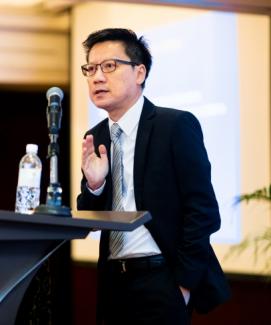
Academic abilities are important in complex jobs with intellectual demands, but non-academic attributes such as situational judgement are critical at work, said Professor David Chan at the SMU Behavioural Sciences Institute Conference 2019.
Above: Professor David Chan, Director of the Singapore Management University (SMU) Behavioural Sciences Institute (BSI) giving his keynote lecture at the annual BSI Conference.
“Academic abilities are critical in work situations and other problem-solving contexts involving intellectual demands such as logical thinking, abstract thinking and academic-related knowledge and skills, but they cannot be the only or even most important contributory factor for success. It is self-defeating if there is an over-emphasis on academic abilities and a neglect of non-academic attributes”, said Professor David Chan, Director of the Singapore Management University (SMU) Behavioural Sciences Institute (BSI), during his keynote lecture at the annual BSI Conference held on 22 February this year with the theme “Much More Than Academic Abilities”.
Key issues discussed at the conference, which was attended by 300 participants from the public, private and non-profit sectors, included the variety of non-academic attributes relevant at the workplace, the focus on academic achievements in education, the evolution of an adaptive workforce in Singapore, and the relationships between academic abilities and the functioning of civil society and politics in Singapore.
Both Matter, But in Different Ways
“Both academic abilities and non-academic attributes like personality, motivation, interests and thinking styles can be useful predictors of overall performance in many jobs, but there are differences in validity between the two types of predictors when we are interested in the specific dimensions of job performance”, Professor Chan said. Take, for example, those important aspects of job performance related to working in teams or organizational citizenship behaviours such as helping co-workers or considering how one’s work may affect another department in the organization. Such performance dimensions, referred to as contextual performance in the research literature, tend to be better predicted by personality and other non-academic attributes rather than academic abilities. Moreover, research has shown that there are many critical processes and outcomes at work that are not dependent, or less dependent, on academic abilities. Professor Chan listed examples like work engagement, team functioning, innovation, crisis management, adaptive performance and resilience.
The Power of Situational Judgement
To illustrate how non-academic attributes can interact in important ways to affect work functioning, Professor Chan shared a series of findings from research that he conducted several years ago in Singapore. One interesting finding that grabbed the attention of the audience, and was referred to multiple times by several subsequent speakers at the conference, was from a study published in the Journal of Applied Psychology. Administering a set of validated measures to a sample of public sector employees, Professor Chan measured their proactive personality, situational judgement effectiveness (SJE) which refers to their ability to make effective judgements in practical situations, and a variety of work-relevant outcomes such as job performance, job satisfaction, organizational commitment and organizational citizenship behaviours. The findings showed that whether being high on proactive personality is adaptive or maladaptive (in terms of whether it helps or hurts the work-relevant outcomes) is dependent on one’s level of SJE. Among employees who are high on SJE, the more proactive ones did better than the less proactive ones. But among those who are low on SJE, the more proactive ones did worse than the less proactive ones.
Professor Chan further shared that other research also replicated the power of SJE in affecting the direction of the effect from other traits (e.g., tolerance of contradictions) to work-relevant outcomes. He cautioned that many non-academic attributes are not inherently adaptive or maladaptive. Instead, they help when SJE is high but they hurt when SJE is low. The same can also be said about academic abilities.
Science and Practice
Professor Chan was recently conferred the Scientist-Practitioner Presidential Recognition, an inaugural prestigious award given by the Society of Industrial and Organizational Psychology, the premier psychology association with 10,000 members worldwide. Consistent with his contributions to both science and practice, Professor Chan emphasized during his keynote lecture the need to translate scientific research into practical applications to address the various critical issues concerning academic abilities and non-academic attributes. He gave this parting shot to the audience, “It does not matter what the position is in the organization or who the person is, the ability to judge situations effectively is critical. It is about focusing on matters that really matter.”
Image credit: Behavioural Science Institute